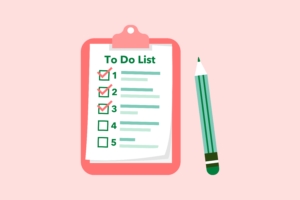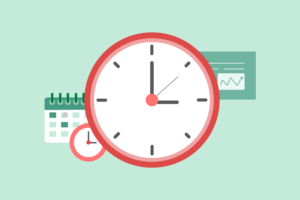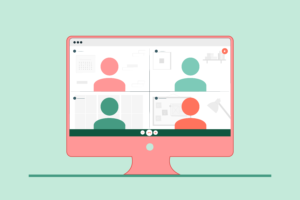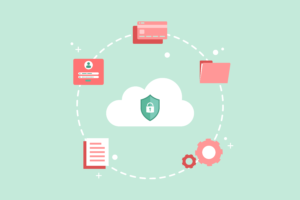Remote workers or people working from home are rising after this COVID-19 pandemic. The necessity of staying home to save lives has opened several options for firms and businesses other than the IT sector.
According to Statista, 56% of US employees worked remotely for at least less than a year before the pandemic outbreak. However, as of June 2024, 11.23 million workers in the United States worked from home sometime in the past four weeks due to the COVID-19 pandemic.
Though remote jobs offer massive flexibility in your work schedule, it also comes with some challenging aspects. As more people work from home, we need well-thought-off strategies and tips to maintain a better work-life balance.
Here are some great tips you can follow to lift up your remote work experience.
Set a Schedule and Stick to it

Flexibility is an integral part of working from home. You can always do things and listen to your family and friends when they need you the most. But it is a counterproductivity trap for people working from home – mainly for two reasons.
- You have to decide what you will do now and then.
- Continuous decision-making will cause decision fatigue, making you lean towards easiness when faced with challenging problems.
Setting a schedule of getting on your desk and completing your work during dedicated hours can save you from hours of procrastination. Moreover, it will serve a sense of accomplishment and keep you motivated for the next day.
Keeping a fixed schedule for work at home, like you in an office, will make it easy for you to concentrate on your work and make better decisions.
Work During Your Most Productive Hours

Many people feel energetic and fueled during the daytime. However, others feel the same during the nighttime. Every one of us has a biological clock inside us, which keeps our brain working during specified hours.
For example, if a person who feels energetic during night hours tries to work during the day, he will face more challenges and difficulties staying awake and productive.
WHY?
Because of the only reason – he is trying to go against what he has inbuilt.
It is a great thing to do from a medical perspective, but it will creep out your productivity and leave you in difficulties.
Instead of using your potential against your innate abilities, a wiser option is to identify your most productive hours and dedicate them to your work. But it has to be the same for every day, week, month, or year. This way, you will use your energy to its fullest to complete your work.
Have a Consistent Daily Routine
Working from home is not just about spending time in front of your computer. Though you are at home, and chores might seem a ten-minute thing to you, you must follow a consistent routine for a productive flow.
Set a routine of waking up, having meals, getting on your desk, breaks between tasks, doing chores, and sleep routine. All of it contributes to keeping your circadian rhythms in line plus helps you get the most out of your day.
Following a consistent routine will help your body nurture, protect it from stress, and make it possible to have enough rest.
Get Ready As You Do For Your Office

Working remotely doesn’t require you to be fully dressed up. However, a productive mind needs you to be dressed up and prepared for the work. However, it doesn’t mean you must wear a three-piece suit. Instead, a different outfit than your night dress would be enough.
You can change into whatever you feel comfortable in, but remember, it should be presentable in meetings. Casual everyday dressing or PJs are the foremost comfortable options to consider, but if it is your night dress, it won’t keep your mind awake.
Don’t Sleep off Your Commute Hours

Remote work offers a great opportunity to wisely invest your time in things that improve your life instead of wasting it on commutes to and from the office. However, the dilemma of easiness can screw up everything in your hand.
Instead of exceeding your sleep hours, wake up as you do when going to the office. Then use the time you spend commuting wisely. You can either read a book, set a morning routine, or get on your desk early.
Any of it can improve the overall quality of your life.
Plan Your Work Calendar
You are supposed to pre-plan your entire week when you work from home as a full-time employee. Several tasks might need pre-approvals, reviews, feedback, and post-completion approval from your managers or team members.
If not planned accordingly, it might cost you several days and can affect your workflow. A better course of action is the determination of task dependencies and realistic deliverables in chronological order.
Figure out if a task needs to be done by any other employee before you, and set their priorities accordingly.
Set Realistic Deadlines
One of the common reasons for being overwhelmed and burned out while working from home is setting unrealistic deadlines. Setting or agreeing to unrealistic deadlines at work could make you work extra hours, feel exhausted, and unable to meet the deadline.
This could result in lowering your willpower, questioning your skills, making you sacrifice your sleep hours, and ultimately being unsatisfied with your job.
The best way to deal with it is to set realistic deadlines. Do not overcommit about your availability or efficiency. If you think you can complete a task in two days, set a deadline for an extra day.
You can reoptimize things during that extra day, plus it will reduce the chances of missing the deadlines.
Furthermore, even if you work from home, which feels like you have full control over your clock and can work 24/7 – do not overburden yourself with tasks. Moreover, always leave room for unpredictable events.
Track Productivity – Analyze Your Direction

Staying at home and constantly working from your home office could make you feel overwhelmed about your activity or productivity at work or career. However, if you keep a check on your targets and goals, it will become easy to determine your overall performance.
You should set weekly goals and break them down into daily targets. Completion of day-to-day targets makes it more likely to accomplish your end goal.
For this, you should try using a project management app like ClickUp. ClickUp allows you to create tasks with all necessary details, assign them to your peers, set statuses, sub-statuses, sub-tasks, dependencies, and much more.
You can also set your ultimate goals, break them down into tasks, and delegate them to your peers or team members. It also lets you track time within each task to have a clearer view of how much time you spend on each task during a typical working day.
In the end, you can check your overall performance through a dashboard view to analyze metrics like workload, priority breakdown, time reporting, completed tasks reports, and much more.
Though using a project management app could feel counterproductive initially, it would work best if you dedicate a few hours during the weekend to plan your week. With this, you can make data-based decisions on your overall performance and find the reason behind any shortcomings.
Improve Your Lifestyle
Flexibility makes remote work look like a gateway to a quality lifestyle. But a good lifestyle isn’t possible without healthy boundaries. So, you ought to be a wee bit strict about what you are supposed to do.
Eat Proper Meals

Ordering food from a restaurant might seem easy, but preparing and eating proper meals at home is better. You must consume a balanced diet to make you feel confident and good about yourself.
A better meal is a foundation for better gut health, and it is only possible when you pay close attention to what you are eating. Avoid processed carbohydrates and add up plenty of fruits and vegetables.
To develop better eating habits, you can do meal preparations right on the weekend. It will make it easy for you to have proper meals when you need them.
Make Some Time for Activities
Spare an hour for some activities. Sketching, painting, or working out at home could be great options. If you like energetic music, you can try some Zumba workout routines or if you want to have a better connection with yourself, try Yin yoga.
Moreover, consider sticking to your pre-set routine and avoid letting your work accumulate in the last few hours of the day. Leaving your desk before 2 to 3 hours of sleep would be best to help you have a night of quality sleep – because only a resting state of mind can fall asleep.
Take Screen-Off Time
Staying in front of your computer’s screen can do more than make you feel tired. Studies have shown a huge impact of higher screen time on sleep quality, sleep latency or the time taken to fall asleep, and sleep duration.
The disturbance in your sleeping patterns can affect your productivity at work. Taking scheduled screen-off time can help you prevent that.
You can take regular screen breaks between tasks and stay away from screens on your day off. It will also help you stay creative and avoid burnout.
Stick to Your Time-off

Time-offs are an integral part of healthy work culture. But in work from home, you might find it hard to stick to your time-off for the common reason – flexibility.
So, make it a pledge of not working or even replying to important business emails during your day off. Instead, make it clear a week ahead that you will be unavailable for a specified time so the entire team can reach out to you before your time off.
During your time off, do things you are supposed to or love to do. But make sure you still stay productive and do not wear yourself out.
Engage with Other People

Working remotely can distance you from friends and co-workers hence leaving you in a state where you might feel alone. Though it’s more likely to have a better relationship with your family, you can’t possibly discuss other topics with them.
Moreover, connecting with new friends would give you a better perspective on different topics. Listening to a different perspective can help you see the same problem from a different angle, making you wiser and improving your cognitive skills.
Connecting with people on different channels, whether online or at events, can help you outweigh your lonesome feelings.
But make sure you stay mindful about socializing. Don’t get into issues with passive-aggressive people. Always take necessary measures regarding boundaries to be within a healthy circle.
Watch Out for Distractions
Working from home brings more sources of distractions. For example, unannounced family or friend visits, your kid might ask you for help with homework, or your maid might ask you for something.
The best solution is to make your schedule clear for everyone. Shutting people down might not work out well. However, you can calmly make them know about your availability.
Plus, take advantage of your to-do list in this. Anything you do outside your to-do list or what you are supposed to do is a distraction.
Turn-on Do-Not-Disturb Mode
While at work, keep your phone, social media, and non-work-related things in do-not-disturb mode. This will help you concentrate on your present task. Better focus and concentration make it easy to do the best quality work.
Many people report a strong urge to quickly check the recent comment on their post, the new notification, or any group update. The best way to deal with it is by delaying it for ten minutes.
After ten minutes, you will find that the urge is no longer the same as it was in the beginning. Ultimately, you will still be focused on what’s more important than checking up on your social activity.
Be Attentive in Meetings

As you work from home, you are supposed to have online meetings unless you work in a hybrid office. So, if you stay attentive and be on time for meetings, you will secure a better reputation showing your competitiveness and sensible aura.
Dress properly, be on time, and stay attentive and responsive during the meeting. But make sure to avoid being a part of excessively long-duration off-topic discussions in meetings.
Make a Small Home-Office

Your performance and productivity greatly depend on your work environment. Working from your bed could feel like a comfy option, but the possibility is that it might turn out into a productivity killer.
You will struggle to keep your mind active and present creative ideas.
A better option is to have a dedicated workspace with a comfy chair and table, appropriate temperature, and proper lighting – including sunlight. You can get better ideas in such an environment.
Rely on Quality Technology
To deliver a quality job, you need to have great instruments. If needed, you should use a laptop with good specs, a camera, headphones, and a mic.
But on top of everything, you need a stable broadband internet connection that works perfectly fine for meetings. Keeping up with a backup solution for emergencies, i.e., unexpected internet outages before an important meeting or deadline, can save your face and reputation.
Invest in Cyber Security

Your data must be safe on the internet to avoid malware or security risks, including data breaches and theft. However, it is a common rule in many companies, especially IT firms, to provide their remote employees with VPN and antivirus software.
From a security perspective, it is always best to keep a password manager separately for work. Using strong passwords and re-checking your webcam and audio settings will help you detect any underlying threat to your important data.
Interact with Your Team
A better understanding of projects, how your team members work, and what you can expect from them as peers depends on how well you nurture the relationship with your co-workers.
Now remote teams use team chat apps to stay connected. You can always jump on a call, a video chat, or use texts to communicate about anything you think would be great to discuss, i.e., about a new job, data entry task, or an update related to real estate.
Or else, just jump into DMs and ask how they have been and if there are any challenges they are facing as remote employees.
Your co-workers are the best support you have to ask about how to make work-related things better. For example, if you are struggling with deadlines, problem-solving, or work-life balance, ask your peers for insights on how they manage things on their end.
Use Better Communication Channels
Businesses use communication apps like Slack for seamless discussions between teams. However, some conversations suit only a certain type of channel. For example, for a fun and interactive conversation, it is better to use video meetings than emails or texts.
So, consider allocating appropriate channels to each type of conversation.
For work-related discussions, it’s always better to keep things aligned with your entire team. So, stick with options that everyone is using. You can try different options for the rest, but do not spend too much time on discussions.
Watch out for Over-Communication

Over-communication or discussing a topic to the extent that doesn’t help in productive ways is troubling in remote settings. You might feel that over-communication about a specific topic will make things clear for your peers, but it makes things hard to understand.
For important discussions, make sure you write a thorough update text in the workspace channel or hold a meeting to describe everything with a Q&A session in the end.
Over-communication just worsens things in remote work because you miss the paraverbal communication that describes things a lot.
However, it doesn’t mean to censor important things that your team members would understand on their own, or they’d eventually know about it – it’s under-communication.
Challenges of Working From Home
Working from home is one of the best opportunities to live a fulfilling, healthy, and spiritually well life. But the temptations of instant gratification make things challenging.
But pledging about major events, like getting on your desk, working for specified hours, taking care of yourself, and doing activities to save you from burnout, can make things quite easy.
But still, it is a life-long journey where challenges arise constantly. Some of the most common challenges for work-from-home employees are:
- An unhealthy relationship with deadlines
- Overcommitment
- Poor communication
- Blurred work-life boundaries
- Losing track of time
- Isolation and feeling disconnected from your team
Identifying and resolving a challenge from its root cause is a great way to go upstream.
Is Working from Home More Productive?
Productivity depends on how well you manage your work when you are at work and work-life balance because remote working brings more possibilities of working on your specified hours when you feel the most productive.
In April 2024, approximately 23 percent of people in Great Britain thought that office workers were somewhat more productive when working from home, while 22 percent thought they would be slightly less productive.
It’s all about how well you optimize your life for betterment.
Does Working from Home Affect Mental Health?
The negative mental health impact of working from home is considerably higher than working from the office. The major reason is isolation and loneliness when you work from home.
Not all days are the same; sometimes, you need more perspective, ideas, and a better outlook on a problem.
For such conversations, friends are the go-to source to reach out.
Working from the office offers a dynamic and positive work environment where everyone motivates you to do your best. This can be adapted to work from home by communicating with your peers.
How to Stay Awake While Working from Home?
Staying awake at work is challenging, especially when you are new to working from home. Taking a sip of water after every 20 minutes can do a better job of keeping your brain active and working.
You can introduce a small grammage of coffee into your work routine. But beware that when things get tough, the caffeine of coffee might make it hard for you to fall asleep.
So, be mindful about what you introduce in your work life. Processed foods seem appealing, but they are always a big NO.
Organic and natural things are always side-effects-free. So, you can try a short power workout, which is brilliant in activating your brain, proper lightning, or working in daylight.
Key Takeaway…
Working from home can offer a plethora of amazing benefits. But to avail of those benefits, you must follow a strict routine and maintain a better work-life balance.
Ultimately, it is all about how well you take care of yourself. Sticking to a schedule will make meeting deadlines easier, giving an adrenaline boost to keep you motivated for the next move.
Engaging in other social and self-care activities helps you keep your internal hormonal system at optimal. It also leads to better circadian rhythms, helping you have quality sleep at night.
After all, baby steps are the foundation of amazing revolutions.


